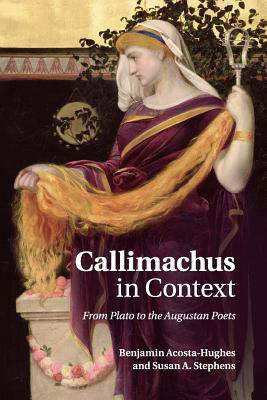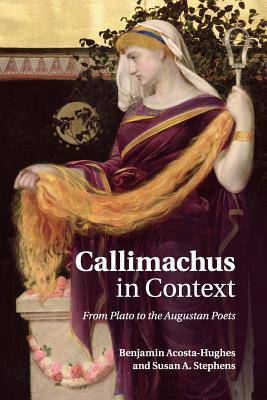
- Afhalen na 1 uur in een winkel met voorraad
- Gratis thuislevering in België vanaf € 30
- Ruim aanbod met 7 miljoen producten
- Afhalen na 1 uur in een winkel met voorraad
- Gratis thuislevering in België vanaf € 30
- Ruim aanbod met 7 miljoen producten
Zoeken
Callimachus in Context
From Plato to the Augustan Poets
Benjamin Acosta-Hughes, Susan A Stephens
Paperback | Engels
€ 60,95
+ 121 punten
Uitvoering
Omschrijving
Scholarly reception has bequeathed two Callimachuses: the Roman version is a poet of elegant non-heroic poetry (usually erotic elegy), represented by a handful of intertexts with a recurring set of images - slender Muse, instructing divinity, small voice, pure waters; the Greek version emphasizes a learned scholar who includes literary criticism within his poetry, an encomiast of the Ptolemies, a poet of the book whose narratives are often understood as metapoetic. This study does not dismiss these Callimachuses, but situates them within a series of interlocking historical and intellectual contexts in order better to understand how they arose. In this narrative of his poetics and poetic reception four main sources of creative opportunism are identified: Callimachus' reactions to philosophers and literary critics as arbiters of poetic authority, the potential of the text as a venue for performance, awareness of Alexandria as a new place, and finally, his attraction for Roman poets.
Specificaties
Betrokkenen
- Auteur(s):
- Uitgeverij:
Inhoud
- Aantal bladzijden:
- 344
- Taal:
- Engels
Eigenschappen
- Productcode (EAN):
- 9781107470644
- Verschijningsdatum:
- 21/05/2015
- Uitvoering:
- Paperback
- Formaat:
- Trade paperback (VS)
- Afmetingen:
- 152 mm x 229 mm
- Gewicht:
- 462 g

Alleen bij Standaard Boekhandel
+ 121 punten op je klantenkaart van Standaard Boekhandel
Beoordelingen
We publiceren alleen reviews die voldoen aan de voorwaarden voor reviews. Bekijk onze voorwaarden voor reviews.











